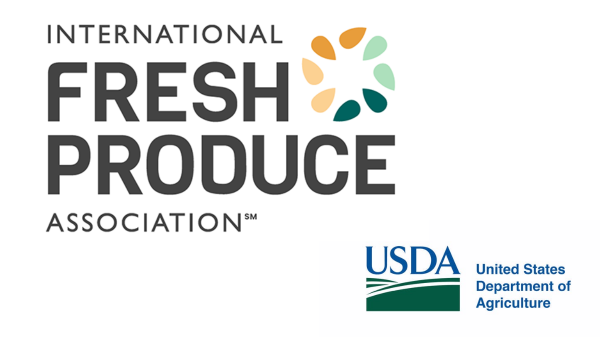Newark, DE. and Washington, D.C. – On Wednesday, February 2, 2022, senior leadership from the International Fresh Produce Association (IFPA) BB #:378962 presented several recommendations on key issues facing the produce sector – ranging from produce safety to nutrition to research/data collection and prioritization – to the U.S. Department of Agriculture’s Fruit and Vegetable Industry Advisory Committee and asked the committee to address these or adopt them.
The IFPA was represented by Co-CEO Cathy Burns, Chief Policy Officer Robert Guenther, Chief Food Safety & Regulatory Officer Dr. Jennifer McEntire, Chief Science Officer Dr. Max Teplitski, and Vice President of Nutrition & Health Mollie Van Lieu.
“The FVIAC advises the Secretary of Agriculture on issues affecting the fruit and vegetable industry,” said IFPA’s Guenther. “Several leaders from IFPA member companies currently serve on the committee and provide diverse insights into the production, marketing, food safety, and nutrition aspects of fresh produce to USDA. We’re pleased to provide recommendations to the committee to help advance its work and continue our ongoing efforts in government advocacy.”
Among the IFPA’s recommendations were:
• Data collection by USDA on Fresh Fruit and Vegetable Program (FFVP) in schools. IFPA recommends that USDA Food and Nutrition Service create a database that includes names of schools that participate in the FFVP, including total amount of funding provided to each school, number of students served, and percentage of students in school who qualify for free or reduced-price meals.
• USDA Procurement/USDA HGAP Requirements. IFPA recommends that potential USDA produce vendors be audited to a GFSI-recognized food safety audit scheme without specifying that the USDA audit is the only permissible audit.
• Buy American Requirement. IFPA recommends USDA provide additional and clearer guidance to schools, including standardized templates to ensure that schools feel empowered to make fruit and vegetable purchasing decisions in the best interest of their students’ nutrition needs that guarantees a wide variety of produce during the school year.
• Data Gap for Fruits and Vegetables at USDA. IFPA recommends the committee assess current USDA programs and departments that collect data on the fruit and vegetable industry and have the agency analyze what other data is needed for its programs.
• Update on State Block Grant Funding Projects for COVID-19. IFPA recommends the committee be given an update on what states have done with their last two years of specialty crop block grant funding, including the supplemental $97 million in 2021, to address COVID-19 related issues for specialty crops in their states.
• Specialty Crop Block Grant Prioritization. IFPA recommends the committee create a process that allows it to recommend top priorities (to USDA) for the states to consider as they develop and approve specialty crop block grant programs.
• Pandemic Response and Safety Program. IFPA recommends the committee be provided a review of this program to better understand its intended goals as well as an update on when mid-sized businesses would be eligible for a program such as this – which was authorized by Congress.
• Impact Assessment of Produce Industry Response to COVID. IFPA recommends USDA Agricultural Marketing Service (AMS) partner with produce industry to a study that is similar to AMS’ partnership with 17 entities that ultimately resulted in a comprehensive report, which focused on pandemic impacts to those 17 different food sectors.
Other recommendations from IFPA called for clarification on vaccine requirements for federal contractors, specifically that they be held on the same vaccination standard as every other privately owned business; the reestablishment of the USDA Specialty Crop Research Committee and that it be operational by end of year; and USDA intervention with OMB to push for the release and timely finalization of this rule.


The International Fresh Produce Association (IFPA) is the largest and most diverse international association serving the entire fresh produce and floral supply chain and the only to seamlessly integrate world-facing advocacy and industry-facing support. We exist to bring the industry together to create a vibrant future for all. We grow our member’s prosperity by conducting advocacy; connecting people and ideas; and offering guidance that allows us all to take action with purpose and confidence. While IFPA is built on the legacy of United Fresh and Produce Marketing Association, it is not just a combination. It is transformational. Recognizing the industry required an even more powerful and unified voice, the leaders of the former United Fresh and Produce Marketing Association chose not to merge, but rather to create an entirely new organization to supersede their organizations, effective January 1, 2022.



